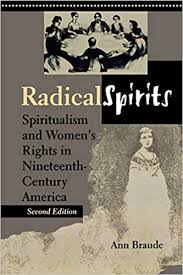by Ann Braude
Braude, Ann. 1993. “Radical Spirits: Spiritualism and Women’s Rights in 19th Century America.” Internet Archive. Beacon P., U.S. January 1, 1993. https://archive.org/details/radicalspiritssp00brau.
Ann Braude, Harvard Divinity School Women’s Studies professor, wrote, Radical Spirits: Spiritualism and Women’s Rights in 19th Century America, in 1991, for Beacon Publishers. The work, Radical Spirits, highlights spiritualism, and spiritualists, rise to prominence in America, with the primary focus on women’s suffrage historiography and the impacts of spiritualists themselves on equality for women.[1] Braude demonstrates time and again that key figures could affect great change, such as the Fox Sisters, Laura Cuppy, and Victoria Woodhull, who ran for president thus pressuring the American political machine to recognize women’s abilities, activism, suffrage, and rights. The rise of the spiritualist’s movement was so popular in America that the movement would spread like wildfire, eventually moving to England and enjoying growth and popularity there as well.
Spiritualism is a religious response to a crisis of faith in the wake of excessive death and oppression in Mid-Century 1800s directly aligning with this historiographic thesis.[2] Though the focus of Radical Spirits is on feminism and the spiritualist’s movement specifically, the overall work deals with the rise and structure of the movement, the organizational hierarchy, and is a staple for inclusion in any historiography on spiritualism in America.[3] Like Braude, Jackson Lears feels the underlying cause of dissatisfaction with religion and a quest for the communication with their dead loved ones, and a proof of an afterlife that drove people to find answers in the form of Spiritualism; it drives women’s autonomy as well as they are often at the forefront of meetings, organizational events, and performing as mediums to the general public.[4] Philippe Ariès, in The Hour of Our Death, notes this period was perhaps one of the greatest in memory for the changing aspects of society and their relationship to death, they were seeking answers to questions of an afterlife that modern Christianity failed to answer in the wake of extraordinary death rates in America. [5] Drew Gilpin Faust’s work, A Republic of Suffering, also looked at the extreme impact of death and dying bearing up the drastic changes of the era noted by Braude as well.[6]
This work is integral to the historiography of the American Spiritualists Movement and showcases the sheer scope of the movement and its influence upon society as a whole. Through death, spiritualists sought to reunite people to their loved ones and give them answers to the questions they sought. Not only the equality they longed for, but the communication with the departed they dearly missed. Mainstream Christianity was not able to meet this need as Lears noted, and Braude expands the impacts of spiritualism and demonstrates the advances made by the movement during the Progressive Era and Gilded Age. Braude’s work is crucial to the development of not only this historiography, but also the Capstone Thesis on the impacts of the culture of death and mourning in Victorian America’s Spiritualists Movement.
- [1] Ann Braude, 1993, “Radical Spirits: Spiritualism and Women’s Rights in 19th Century America,” Internet Archive, Beacon P., U.S. January 1, 1993, https://archive.org/details/radicalspiritssp00brau.
- [2] Ibid, 4.
- [3] Ibid, 3.
- [4] T. J. Jackson Lears, 2010, “Rebirth of a Nation: The Making of Modern America, 1877-1920,” New York: Harper Perennial, 238-239.
- [5] Philippe Ariès, 1981, “The Hour of Our Death,” Internet Archive. New York: Knopf: Distributed by Random House, January 1, 1981, https://archive.org/details/hourofourdeath00aris/page/n9. xv-xvii.
- [6] Drew Gilpin Faust, “This Republic of Suffering: Death and the American Civil War,” New York: Alfred A. Knopf, 2012.
Bibliography
Ariès, Philippe. 1981. “The Hour of Our Death.” Internet Archive. New York: Knopf: Distributed by Random House. January 1, 1981. https://archive.org/details/hourofourdeath00aris/page/n9.
Braude, Ann. 1993. “Radical Spirits: Spiritualism and Women’s Rights in 19th Century America.” Internet Archive. Beacon P., U.S. January 1, 1993. https://archive.org/details/radicalspiritssp00brau.
Faust, Drew Gilpin, “This Republic of Suffering: Death and the American Civil War.” New York: Alfred A. Knopf, 2012.
Lears, T. J. Jackson. 2010. “Rebirth of a Nation: The Making of Modern America, 1877-1920,” New York: Harper Perennial.
